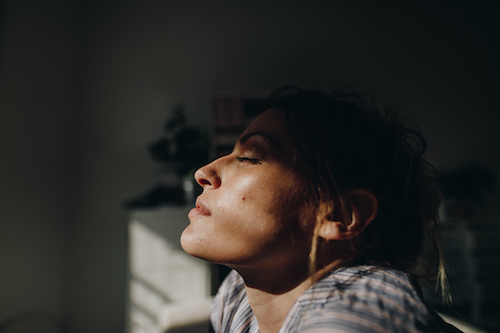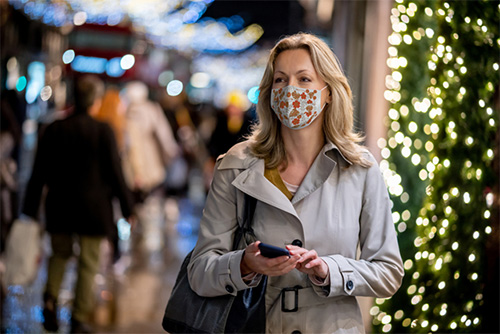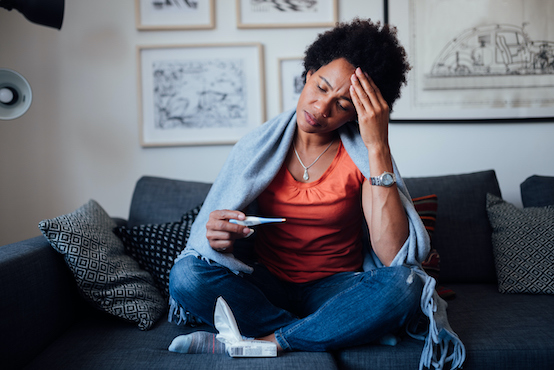Authored by Dr. Sharon Stills, NMD
Are you still suffering from fatigue, body aches, brain fog and other debilitating symptoms weeks or even months after “officially” recovering from the Covid-19 virus?

If so, you can count yourself part of a large group of women who have unfortunately gone on to develop “long hauler” Covid symptoms or “long Covid.” We are still learning exactly what triggers Covid-related symptoms after the original infection has resolved. As a new study published in the The Lancet revealed, symptoms of long Covid can last up to a year.
However, there’s also good news: If you’ve got symptoms of long Covid, there’s a lot you can do right now to feel better
- Support immune system regulation You want your immune function to have everything it needs to mount a healthy response to a virus — but you also want to make sure it has what it needs to recover from all this hard work. Your immune system may be in a state of imbalance and dysfunction after fighting off Covid-19, and this may be contributing to your symptoms. So, a good first step is to nourish and help replenish your immune system. New research has come out in the past year on nutrients that best support immune function health and regulation:
- Getting enough Vitamin D helps immune system function. Studies have shown it prevents severe Covid symptoms, reducing risk for multiple, severe symptoms (a contributing factor to long Covid), and also helps immune function “bounce back” post-virus.
- Probiotics can support immune system regulation, since almost 80% of your immune cells reside in the gut. Good gut flora is essential for balanced immune function.
- Melatonin, the body’s main sleep hormone, also acts as an antioxidant to help protect your immune cells from free radical damage, preserving cellular function.
2. Support your lymphatic system. Another important recovery step is helping your body detox by getting your lymph moving. Your body’s lymphatic system is responsible for removing cellular waste products and other toxins from your system. After a bout of Covid, your system may be overwhelmed with waste and toxins to dump, which can contribute to fatigue and brain fog. So, give your lymphatic detox system some added support. An easy way to do this is through sweating. Take a warm bath, go for a brisk walk (if you are able to), try a portable infrared sauna, and explore these other simple tips to support your lymphatic system.
3. Decrease inflammation. While there is still so much to be known about long haul Covid, the possible connection with autoimmune issues means that lurking behind the scenes in all this could be inflammation. We do know that in severe cases of Covid, there can be an over-abundance of inflammation-promoting cytokines. This can be a sign of an overactive immune system. Having post-Covid symptoms like joint pain is another clue that your system is overwhelmed with inflammation. You can take steps to decrease inflammation by making simple diet and lifestyle changes.
4. Shore up other health issues. The confounding part about long hauler symptoms is that most overlap with the hormonal symptoms that women in their 40s and 50s may already be experiencing. Are your fatigue and brain fog the result of long Covid or perimenopause? Is your hair loss a sign of low thyroid or could it be a reaction to Covid? Carefully assess your health and take action where you can. You want to be sure that you aren’t overlooking your hormones, or the opposite, that you explain away post-Covid symptoms as perimenopause. You can use our free Hormonal imbalance quiz to help you identify hormonal symptoms.
5. Prioritize your sleep
If you’re feeling exhausted, it’s important to figure out how much sleep you’re actually getting. Falling asleep and staying asleep is an issue for many individuals. If you’re getting unrefreshing sleep, even though you’re in bed a normal number of hours, work on your sleep hygiene. Melatonin can help here too as the master sleep hormone can help you reset your circadian rhythms. You can also try a stress supplement to ease stress hormone imbalances that may be contributing to your sleeplessness.
Long Covid may be a risk, but that doesn’t mean it’s forever. Do what you need to do to get the targeted help you need to support your health.











